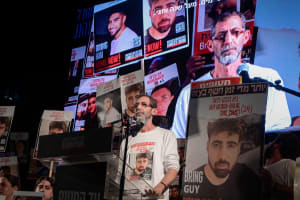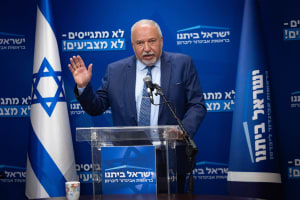UN: Israel must dispose of all its nuclear weapons
US ambassador to UN: ‘Once again,’ disproportionate number of UN resolutions target only Israel

The United Nations General Assembly First Committee, which has pursued a “nuclear-weapon-free world” for years, voted on Friday for a resolution that demands Israel dispose of any nuclear weapons and place any nuclear sites under the International Atomic Energy Agency’s authority.
The First Committee voted 152-5 on the Egypt-led resolution, which was co-sponsored by the Palestinian Authority and 19 other countries that include Israel’s Abraham Accords partners Bahrain, Morocco and the United Arab Emirates.
While mentioning the Jewish state, despite Israel never confirming that it has nuclear weapons, the “risk of nuclear proliferation in the Middle East” resolution made no mention of Iran’s ongoing nuclear activities or ambitions.
The resolution pressed Israel to fall in line by signing the “Non-Proliferation of Nuclear Weapons Treaty,” which recognizes only the United States, Russia, the United Kingdom, France and China as being “nuclear-weapons states.” India, Israel, Pakistan and South Sudan are four nations that are not NPT signatories, while North Korea withdrew from the NPT in 2003.
The resolution stressed “the importance of Israel’s accession to the NPT and placement of all its nuclear facilities under comprehensive International Atomic Energy Agency safeguards, in realizing the goal of universal adherence to the Treaty in the Middle East.”
The resolution called on Israel “to accede to the Treaty without further delay – not to develop, produce, test or otherwise acquire nuclear weapons, to renounce possession of nuclear weapons and to place all its unsafe guarded nuclear facilities under the full scope of Agency safeguards as an important confidence-building measure among all States of the region and as a step toward enhancing peace and security,” the resolution said.
Israel, Canada, the United States, Micronesia and Palau were the only countries to vote against the resolution, while another 24 nations abstained, including the member states of the European Union. The resolution will go to the UNGA plenum later this year for a final vote.
The First Committee also called for a nuclear-free zone to be established in the Middle East, which only Israel voted against, while the U.S., Cameroon, Comoros and Tanzania abstained.
Israel does not believe that the NPT solves the complicated issues of security in the Middle East, especially because it is only relevant to the extent that its signatories comply, as Israel’s deputy ambassador to the U.N. Michal Maayan said in a debate earlier this month.
“Four of the five cases of serious violations of the NPT took place in the Middle East since its entry into force,” he said. “For decades now, Iran has been rapidly advancing its illicit nuclear programs and currently possesses large quantities of highly enriched nuclear material. The existence of undeclared nuclear activities in Syria remains relevant and worrisome, as well as the open questions related to the nature and operational state of the specific sites.”
Maayan stated that, as long as there are countries in the region that do not recognize Israel’s right to exist as a state, it is meaningless to talk about regional security architectures.
“Some actors in the region claim that a comprehensive security architecture can be initiated in the Middle East, with direct engagement with Israel, without recognition of Israel’s right to exist within safe and secure borders, without reducing regional tension and the building of the necessary trust and confidence among regional states. … This position is untenable,” Maayan said.
U.S. Ambassador to the U.N. Linda Thomas-Greenfield pointed out in the U.N. Security Council on Friday that the U.N. “once again” was rubber-stamping a large number of resolutions targeting only Israel.
“As we head into the height of the committee season, we are once again facing a disproportionate number of resolutions with an unfair focus on Israel,” Thomas-Greenfield said. “These one-sided resolutions and activities are a distraction and do nothing to improve the situation on the ground.”
Thomas-Greenfield emphasized that the resolutions do not reflect that times have changed or that several Arab countries have normalized relations with Israel.
“These outdated texts do not reflect the changing realities on the ground, with new possibilities for cooperation ushered in through the Abraham Accords and other normalization agreements,” she said.
The ambassador recommended redirecting the energy away from that “unfair focus on Israel” toward constructively working to advance peace, saying she believed the Palestinian people need a political horizon and “something to hope for.”
“Rather than simply rubber-stamping these General Assembly resolutions, we should all be thinking about how to collectively advance the cause of peace,” Thomas-Greenfield said.

The All Israel News Staff is a team of journalists in Israel.













